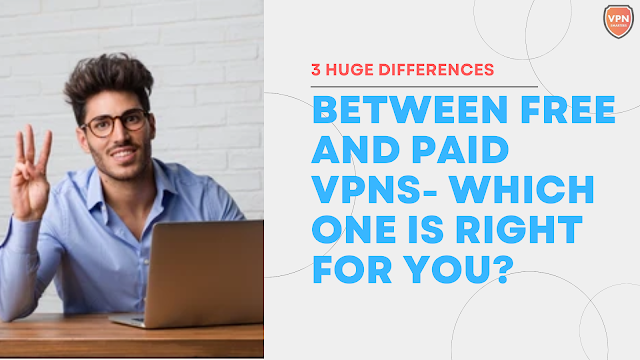3 Huge Differences Between Free and Paid VPNs- Which One Is Right for You?
A VPN, or Virtual Private Network, is a private network that encrypts and tunnels Internet traffic and allows users to remain anonymous. There are many reasons why someone might want to use a VPN. Maybe you work from home and want to securely connect to your company's network, or maybe you're concerned about online privacy and want to keep your browsing history private.
There are two main types of VPNs: free and paid. Free VPNs are often supported by ads, which means your browsing activity is being tracked and sold to third-party advertisers. Paid VPNs don't have this issue because they don't need to make money off of their users in order to stay afloat. Find out the three huge differences between free and paid VPNs so that you can decide which one is right for you.
3 Huge Differences Between Free and Paid VPNs:
Security:
When it comes to VPNs, there are two main types: free and paid. Both have their own advantages and disadvantages, but one of the main differences between the two is the security policy. A paid VPN will typically have a much stricter security policy than a free VPN. This is because paid VPNs need to make sure their users are as safe as possible from online threats. They do this by using top-class protocols and maintaining a 100% no-usage-logs policy. This means that your data is never stored or monitored by the VPN provider. On the other hand, free VPNs may not have such strict policies in place. This can make them more vulnerable to online threats. However, free VPNs can still be used safely if you take the time to research them and choose one with a good reputation.
Speed:
There are a few key differences between free and paid VPNs. One of the most notable is speed. Paid VPNs typically offer much faster speeds than free VPNs. This is because free VPNs often have fewer servers and lower bandwidth than paid VPNs. This can make a streaming video or downloading large files very slow with a free VPN. Another difference between free and paid VPNs is security. Free VPNs may not encrypt your traffic or offer as many security features as paid VPNs. This means that your data could be more vulnerable to hackers when using a free VPN.
Overall, paid VPNs tend to be better in terms of speed, security, and features. However, free VPNs can still be useful if you just need basic protection and don't mind slower speeds.
Reliability:
There are a few key differences between free and paid VPNs that can impact reliability. One of the main differences is in how easy it is to configure the VPN. Free VPNs often have fewer options and may be more difficult to set up. Paid VPNs usually have more options and are easier to configure. This can make a big difference in reliability, especially if you're not familiar with setting up VPNs. Another difference is in the number of servers available. Paid VPNs typically have more servers, which can provide better coverage and reliability. Finally, paid VPNs often have better support than free ones. If you're having trouble with your VPN, you're more likely to get help from a paid provider.
Which One Is Right for You?: It Depends on Your Needs:
When it comes to VPNs, there are two main options: free and paid. So, which one is right for you? Here’s a look at the pros and cons of each option to help you make the best decision for your needs.
Free VPNs are great for those who want to save money and don’t need all the bells and whistles that come with paid VPNs. However, free VPNs often have slower speeds and may not be as reliable as paid VPNs.
Paid VPNs offer more features and tend to be more reliable than free VPNs. However, they can be more expensive and may not be worth the extra cost if you don’t need all the features they offer. Ultimately, the best option for you depends on your needs and budget.




Comments
Post a Comment